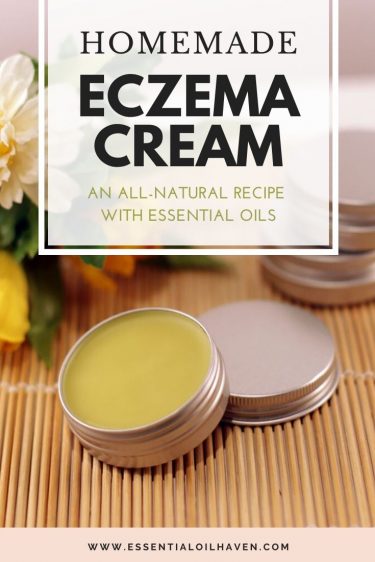
If you are afflicted with eczema, you understand how irritating and uncomfortable it can be. It is not contagious though, but it is a skin disorder which is becoming increasingly common.
Common as it might be, eczema is still an uncomfortable and at times debilitating condition that may compromise your quality of living. I don’t blame you for wanting to find a natural, homemade DIY solution for it.
This post contains affiliate links, which means if you make a purchase through these links, I may receive a small commission at no extra cost to you. Read my full disclosure policy here.
Ready?
The secret sauce: Calendula herbal oil and Manuka essential oil.
What Is Eczema?
Eczema is a generic term used to describe a variety of inflamed skin conditions. It may be a result of a gene variation that affects the performance of the epidermis, which is the outer layer of the skin that acts as a barrier to protect the body from the irritants, allergens and microbes of the outside environment.
What Causes Eczema Flare-Ups?
Eczema is a skin condition that is not fun to have. It is also hard to tell precisely how long an eczema outbreak will last.
The reason for eczema isn’t fully understood, though it’s thought to be brought on by an over-reaction in the human body’s immune system once it responds to an allergen attack.
Eczema is a very individual disease, and can stem from different factors for different people. This makes it a little bit tough to treat. It usually develops when an individual becomes overly sensitive to an allergen.
If you do suffer from eczema, it is crucial that you take note of what conditions cause a break out or flare-up. Some of the most common causes for eczema are ¹:
- Lack of moisture: As the air gets dryer toward winter months, the skin can easily become rough and brittle, leading to increased eczema flare-ups. If you regularly suffer from eczema, your #1 home remedy should be to keep your skin well moisturized and never too dry. Take simple actions to continue to keep your skin hydrated and comfortable.
- Environmental irritants: If your sensitive skin comes into contact with a chemical irritant such as a different household cleaner, artificial fragrance, or other products (household glue, some adhesives, disinfectants, and even personal care products or laundry detergents), it can become inflamed and flare up.
- Stress and emotions: For others, the triggers are more emotionally-based, such as high levels of stress, or repeated anxiety attacks.
- Hormones: For women especially, fluctuations in natural hormone levels may affect eczema conditions. Some children outgrow their eczema, or it is known to improve for a long period of time, only to resurface during the start of puberty.
- Allergens: Some everyday materials can trigger eczema flare-ups. Examples are seasonal pollen, pet dander, dust mites, or mold.
Maintain a record of your symptoms and the way you are handling them. Aggravating its symptoms repeatedly is one of the reasons why the overall body’s immune system has a tough time dealing with eczema – and beating it for good.
Luckily, there are a number of easy things you can do to heal from eczema and get rid of the horrible itch it can cause.
How To Treat Eczema
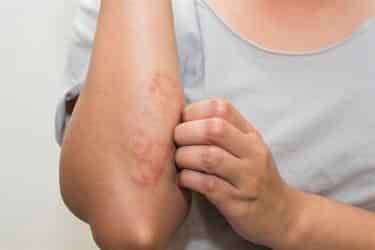
Eczema is an inflammatory skin condition
Eczema treatments aren’t in any respect difficult to get started. While pharmaceutical treatments are helpful, they simply suppress symptoms but don’t heal the source of the issue.
There’s no absolute treatment for eczema that works for everyone with the condition. However, there are various methods of fighting its symptoms.
For brief spans of time, steroid creams can be used as an eczema therapy. You might require an antibiotic cream prescription or other therapy, based on the assessment of your medical care provider.
As natural compounds of plants, essential oils have many homeopathic benefits that have been known to help with a range of skin issues. Rather than using cortisone-based products, you can decide on using essential oils instead.
Top 7 Best Essential Oils for Eczema
Essential oils are a natural eczema treatment that is easy to mix up, and easy to try out. Essential oils have many advantages and can help in the prevention or healing of several issues related to skin health.
- Lavender: To support healthier skin overall, heal minor skin irritations, and use as antiseptic and anti-inflammatory oil.
- Tea Tree: To use as an anti-fungal and anti-inflammatory.
- Manuka: To combat skin infections and irritations.
- Oregano: To deal with external fungal infections.
- Copaiba: To promote wound healing.
- Helichrysum: To disinfect irritated skin and support cell regeneration.
- Cedarwood: To reduce skin scarring as well as kill bacteria and fungus.
NOTE: Because eczema symptoms differ from person to person, it can be useful to mix and match various oils from this list to find the one that YOUR immune system responds to.
DIY Eczema Cream Recipe
If you currently have an eczema outbreak, your best bet is to address the signs immediately. Eczema isn’t fun in the slightest! This DIY eczema cream is an all-natural solution that you can feel good about applying to your skin.
Please also attempt to work out the potential causes for YOUR eczema as the eczema causes aren’t eliminated by the treatment with essential oils. Only the symptoms of eczema can be addressed with a healing salve.
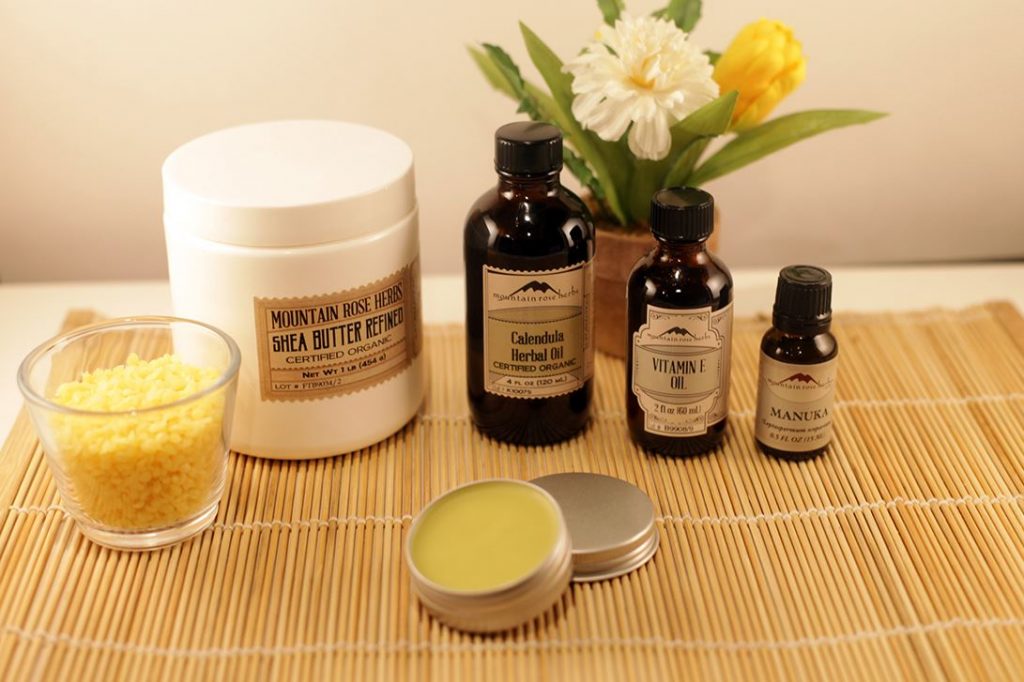
Work with high-quality, organic ingredients. For example, these here from Mountain Rose Herbs.
Shop Here
DIY Eczema Cream Ingredients
- 2 tbsp Shea butter
- 1 tbsp Beeswax pastilles
- 2 tbsp Calendula-infused herbal oil
- 1 tsp Vitamin E oil
- 25 drops Manuka essential oil
- 15 drops Lavender essential oil
Buy top-quality ingredients from Mountain Rose Herbs here. Mountain Rose Herbs is one of our top 10 best and highly recommended essential oil brands.
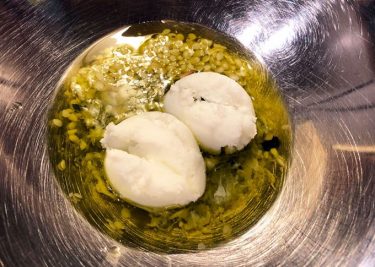
Melt all of your base oils in a double-boiler over medium heat.
How To Make A Homemade Eczema Cream
- Add the first 3 ingredients to a double-boiler. If you don’t have a professional double-boiler, a simple steam double boiler made with a regular cooking pot and aluminum or glass bowl, will do. That said, a double boiler (like this one here) would be a fantastic little home DIY investment (or birthday gift idea).
- When all of the solids have melted, remove the mixture from the heat.
- Add the 1 tsp of vitamin E oil, and the essential oils.
- Stir to combine.
- While still hot, distribute the liquid mixture into your round metal containers (I used these ones here)
- Let cool for 15 minutes.
- Close the lids, and label them (I use this labeler here and it is fantastic!)
- When you use the cream, massage it into your skin with circular motions.
Why Use Shea Butter for Eczema?
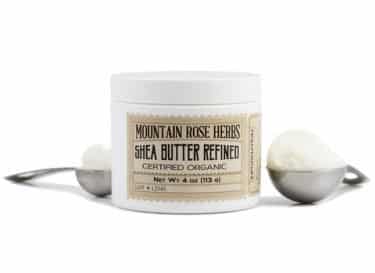
Refined Shea Butter from Mountain Rose Herbs
Get It Here
Shea butter is an excellent natural moisturizer to help combat eczema because it contains a high percentage of healthy oils and fatty acids. Shea butter is well known for its anti-inflammatory and moisturizing properties and is a popular base oil for many aromatherapy applications.
- The oils deeply penetrate the skin and support skin cell regeneration.
- Shea butter forms a protective barrier on the skin, preventing flare ups and irritations.
- Its vitamins A, E and F promote the healing of dry, rough skin patches.
- Unrefined shea butter does not contain preservatives, additives or other chemicals that my leave skin more depleted than .
Manuka Essential Oil Benefits
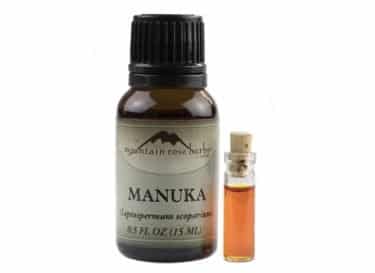
Manuka Essential Oil from Mountain Rose Herbs
Get It Here
I used Manuka essential oil in this homemade eczema cream recipe because Manuka carries great benefits for dry and irritated skin.
The native populations of New Zealand have traditionally used all parts of this plant as an important part of their healing tradition. It prevents bacterial infections, improves symptoms of dry scalp, and carries a relaxing nature with it ².
Manuka is related to Melaleuca (Tea tree) essential oil, as they are both part of the same botanical family of Myrtaceae. Still, they are distinctly different oils. Tea tree oil is native to Australia, Manuka is native to New Zealand.
Vitamin E for Eczema
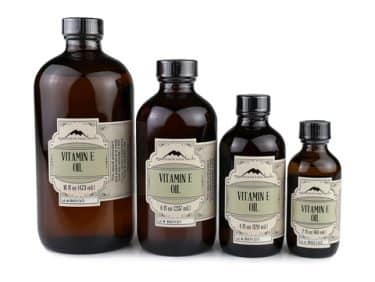
Mountain Rose Herbs Vitamin E Oil
Get It Here
Eczema is a very familiar condition in which the skin becomes dry, scaly, red and particularly itchy. The vitamin E oil in this natural eczema cream adds a superb boost for your skin’s overall health and skin cell reproductive abilities.
In Summary
There are several natural means of handling an eczema break-out that are safe and can end up being effective in several cases. Most men and women prefer this natural way of treating eczema, since it does not have any side effects and this DIY cream is also not as expensive as other solutions you may be prescribed.
However, if you suspect you’ve developed eczema, or your condition is severe and worsening, you ought to be diagnosed and treated by the means of a physician.
Suppressing eczema symptoms really isn’t the response to treating eczema as the signs will be back again and again as soon as the medication subsides. However, they can make your life a whole lot more comfortable in the meantime – especially if you’re using our beautiful DIY natural eczema cream recipe. When applied topically, it’s a cream that can aid the treatment of many different types of skin conditions.
Sooner or later though, you should think about getting to the origin of your eczema outbreaks – and sort out your triggers to get rid of the condition for good.
References
¹ Eczema Causes and Triggers: National Eczema Association: https://nationaleczema.org/eczema/causes-and-triggers-of-eczema/
² Manuka Essential Oil: Benefits, Uses, & Side Effects: https://mindbodymastered.com/blog/manuka-essential-oil





NEED to make this!
Hi there,
What could be used as a substitute for Manuka?
Thank you
Hi Natasha, thank you for your question! You can substitute with Tea Tree (Melaleuca) essential oil. Tea tree and Manuka are “cousins” in the same botanical family.
Hi Emma,
Thanks for the recipe! My 7 month baby has stubborn eczema that refuses to go away! It got better for few days after applying steroid cream and then came back again :(
Can you advise if the recipe is suitable for baby below 1yo
Thanks.
Lee